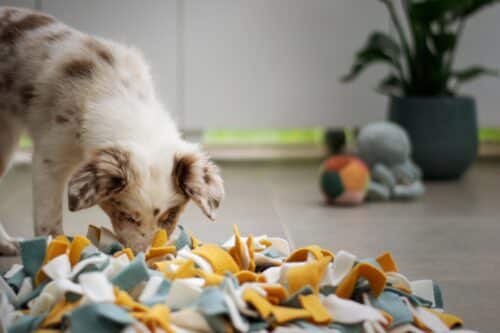Bringing home a new puppy is an exciting adventure filled with love, playtime, and cuddles. But did you know that proper socialisation is the key to raising a well-rounded, confident, and well-behaved dog? In this blog post, we’ll guide you through the process of “how to socialise your puppy to new experiences”, from understanding the importance of early socialisation to enrolling in puppy training classes.
Short Summary
- Invest in puppy socialisation to form a strong bond and create a confident, well-mannered companion.
- Prevent fear & anxiety by introducing your pup to positive experiences early on.
- Attend puppy classes and use reward-based training methods for the best socialisation experience!
The Importance of Puppy Socialisation
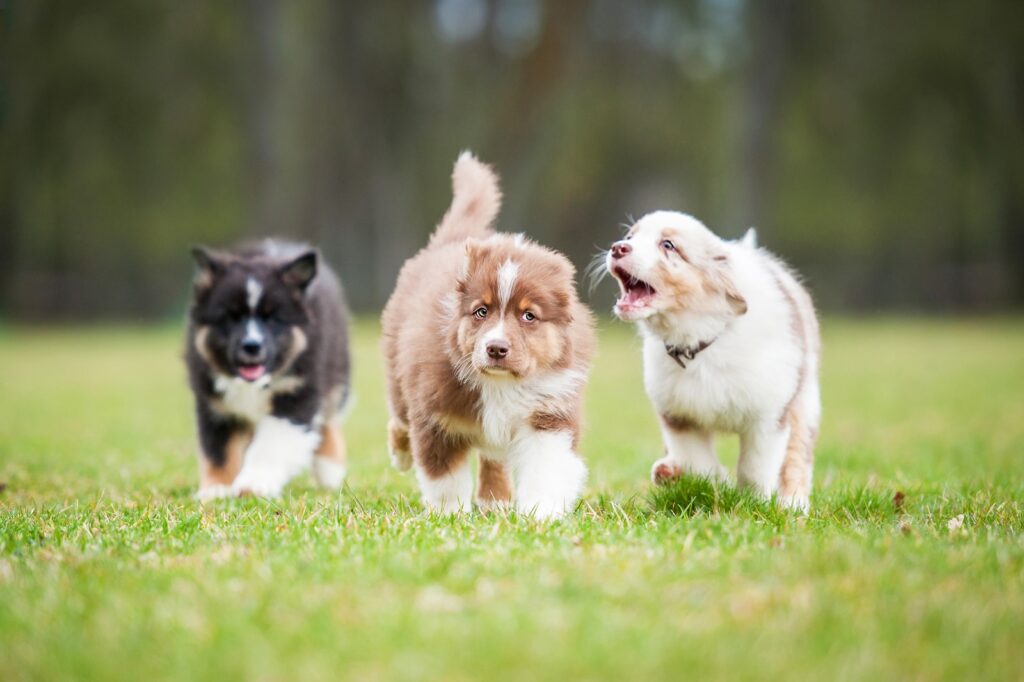
The benefits of proper puppy socialisation cannot be overstated. A well-socialised puppy will grow up to be a confident dog, less susceptible to fear and anxiety, and better able to interact with people, other animals, and a variety of environments.
By prioritising socialisation from the very beginning, you’re investing in a strong bond with your puppy and setting them up for success as a well-mannered companion.
Preventing Fear and Anxiety
The first few weeks of a puppy’s life are crucial for socialisation. Starting this process early, breeders should provide gentle handling to ensure a positive experience for the puppy. By exposing your puppy to various people, animals, and environments, you can help them become confident in different situations and prevent the development of fear and anxiety.
When socialising your pup before full vaccination, consider visiting low-risk locations, attending puppy classes, and utilising puppy playgroups to keep them safe and engaged. The key is to recognise signs of stress and help your puppy build confidence gradually, using treats and distractions to make them feel more comfortable.
Building a Strong Bond with Your Puppy
Continuing the socialisation process at home is essential to building a strong bond with your new puppy. Introduce them to family members in a calm and encouraging manner, ensuring a positive experience. When inviting friends over, make sure the environment is quiet and free of distractions for a calm, neutral start.
Introduce your puppy to strangers in controlled environments, such as parks or pet stores, to foster positive interactions. Remember to be patient and take your time with this process, as it will be well worth it in the end, creating a strong connection between you and your puppy.
Creating a Well-Mannered Companion
Fostering positive interactions with other animals is crucial for developing a well-mannered companion. When introducing your puppy to adult dogs, expose them to well-behaved, friendly dogs to gain valuable insight into understanding and respecting boundaries. Arrange playdates with other puppies to help your pup learn appropriate play behaviour and social skills.
When introducing non-canine pets, ensure that the interactions are closely monitored and reward positive behaviour with treats to promote a peaceful relationship between all members of your household.
Starting Early: The Crucial Socialisation Period
The crucial socialisation period for puppies occurs between 3 to 16 weeks of age. During this time, your puppy’s brain is like a sponge, absorbing information about the world around them.
This is the perfect opportunity to expose your puppy to as many positive experiences as possible, helping them become a confident and well-rounded adult dog. By introducing your puppy to different environments, situations, and stimuli, you’re not only creating a well-adjusted companion, but also preventing potential behavioural problems later in life.
The First 3-16 Weeks
During the first 3-16 weeks of your puppy’s life, they are learning and developing vital social skills through play and exploration. This is the time to start teaching behavioural lessons and exposing them to various people, places, and objects in a controlled and positive manner.
The American Veterinary Society recommends that puppies should be socialised during this period, as it sets the foundation for their behaviour and temperament throughout their life.
The Role of Breeders in Initial Socialisation
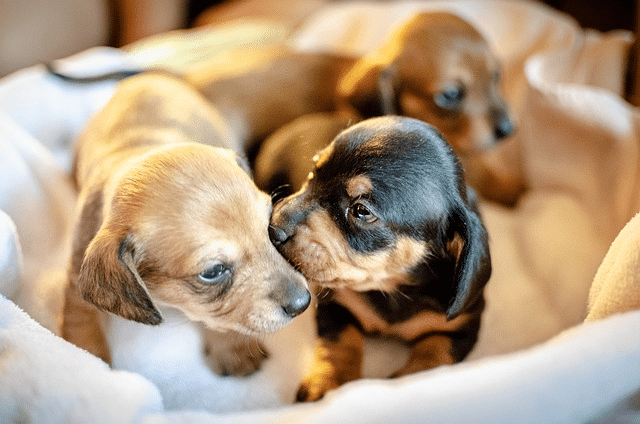
Breeders play a crucial role in the initial socialisation of puppies. A responsible breeder will start the socialisation process by providing gentle handling, and exposing the puppies to safe indoor and outdoor environments, car rides, crates, and various sounds and smells.
This early socialisation helps ensure that your puppy has a positive foundation to build on once they arrive in their new home.
Continuing the Process at Home
Once your new puppy arrives home, it’s essential to continue the socialisation process. Encourage your puppy to explore their environment and introduce them to new experiences, such as vacuum cleaners, people wearing hats, doorbells, and other household pets.
By creating positive associations with these new sights, sounds, and experiences, you’re setting your puppy up for success as a well-rounded, confident, and well-behaved adult dog.
Introducing Your Puppy to People
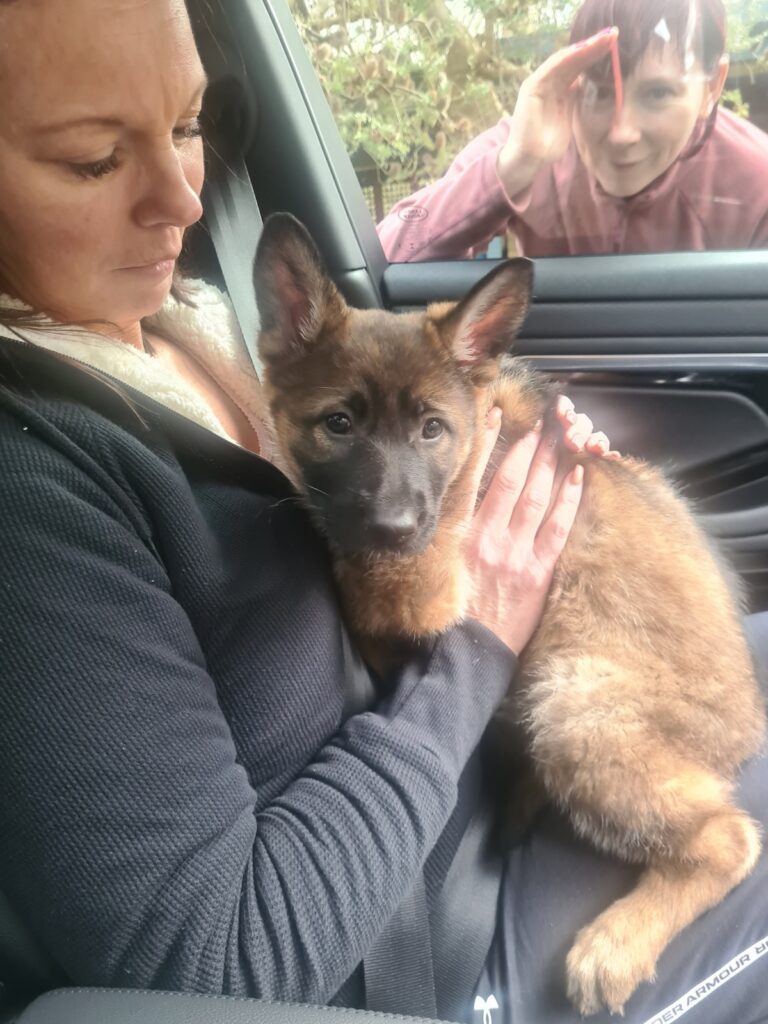
Socialising your puppy with people is a significant aspect of the socialisation process. By introducing your puppy to a variety of individuals, including family members, friends, and strangers, you’re helping them develop positive associations with people and ensuring they grow up to be a well-adjusted and well-behaved companions.
In this section, we’ll discuss how to introduce your puppy to different people, ensuring a successful and positive experience.
Meeting Family Members
When introducing your puppy to family members, it’s essential to create a calm and positive environment. Encourage family members to approach the puppy gently and offer treats as a reward for calm behaviour.
By providing positive experiences with family members, you’re helping your puppy build trust and confidence in their new surroundings.
Inviting Friends Over
To expose your puppy to a variety of people, invite friends over for short, positive visits. Encourage your friends to interact with your puppy calmly, offering treats and praise for good behaviour.
Remember to keep the environment quiet and free of distractions, ensuring your puppy feels comfortable and secure during these interactions.
Encountering Strangers
Introducing your puppy to strangers is an essential aspect of socialisation. To ensure a positive and successful interaction, choose controlled environments such as parks or pet stores for these introductions. Keep your puppy on a leash and be aware of the environment, ensuring they don’t become overwhelmed or frightened.
Reward your puppy with treats and praise for remaining calm and well-behaved during these encounters.
It is equally crucial to avoid imposing interactions upon your puppy.
Fostering Positive Interactions with Other Animals
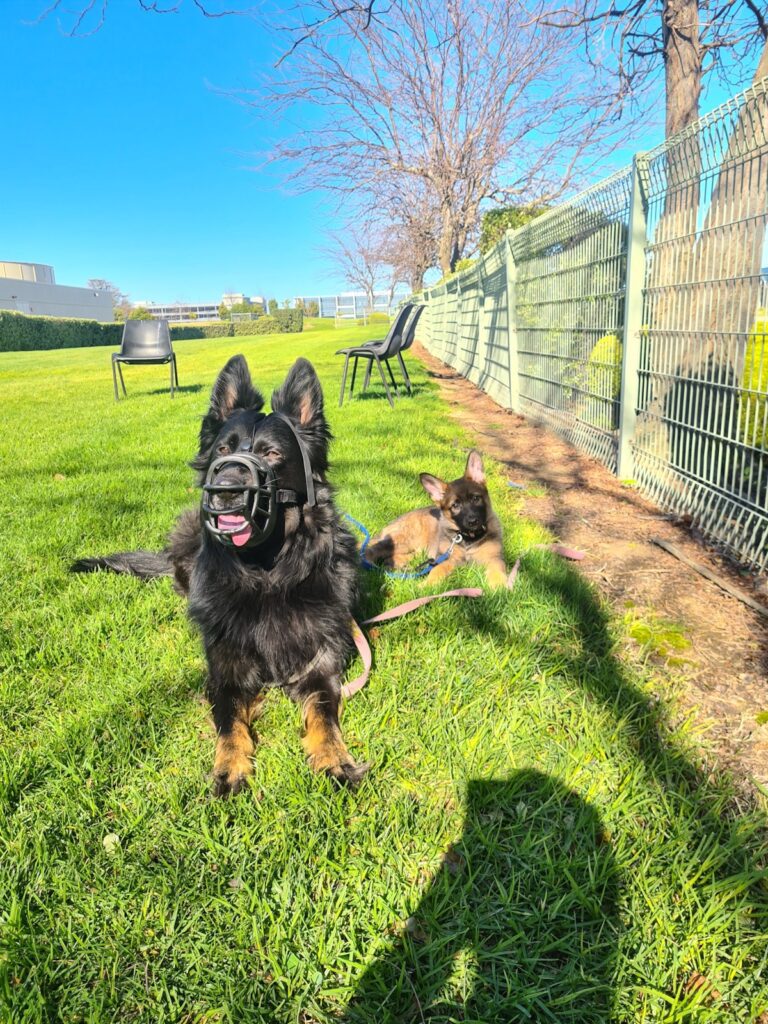
In addition to socialising your puppy with people, it’s essential to foster positive interactions with other animals. This includes meeting adult dogs, playdates with other puppies, and introducing non-canine pets.
By exposing your puppy to a variety of animals, you’re helping them develop essential social skills and ensuring they grow up to be a well-adjusted and well-behaved companion.
Meeting Adult Dogs
Introducing your puppy to adult dogs is an important aspect of socialisation. To ensure a successful interaction, choose well-behaved, friendly adult dogs as playmates for your puppy. Start by introducing the dogs on neutral territory, such as a park, and keep both dogs on a leash to maintain control over the situation.
Positive interactions with adult dogs can provide valuable lessons for your puppy, helping them understand and respect boundaries.
Playdates with Other Puppies
Playdates with other puppies are a fantastic way for your pup to learn appropriate play behaviour and social skills. When organising playdates, ensure that the puppies are matched in size and temperament, and closely supervise the interactions.
Remember that playdates should be fun, positive experiences for your puppy, so be prepared to intervene if any issues arise.
Introducing Non-Canine Pets
If you have non-canine pets at home, it’s crucial to introduce your puppy to them in a controlled and positive manner. To ensure a successful interaction, closely monitor the animals’ behaviour and reward positive interactions with treats. By fostering peaceful relationships between your puppy and other household pets, you’re creating a harmonious living environment for all.
Familiarising Your Puppy with Different Environments and Situations
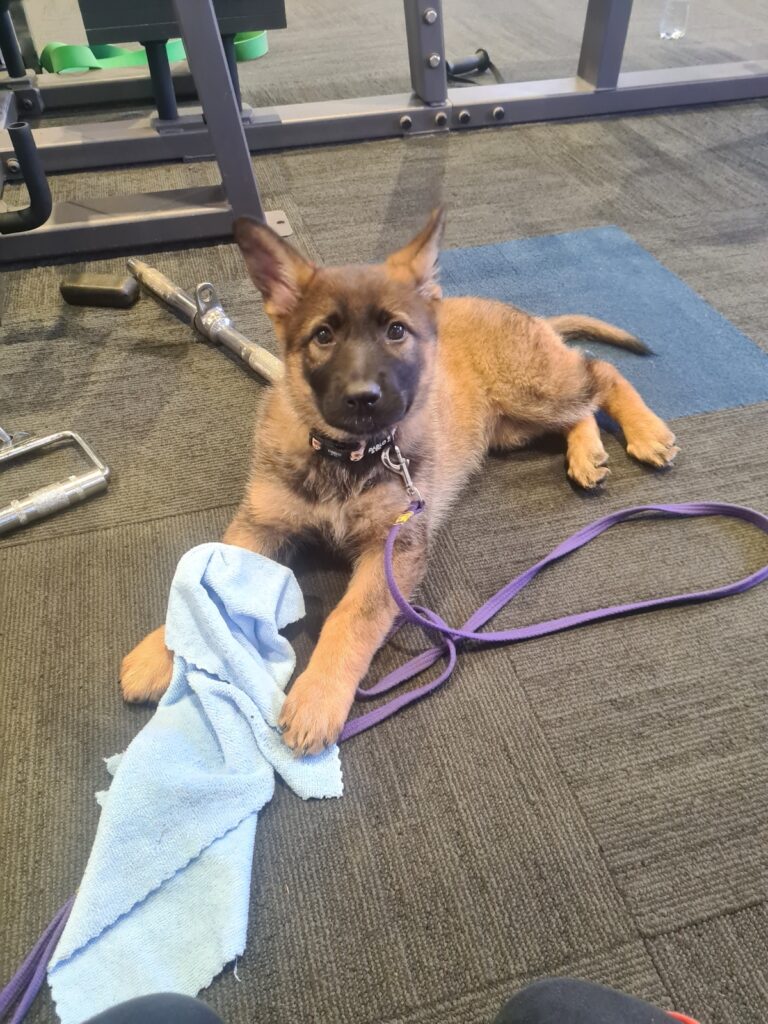
Exposing your puppy to a variety of environments and situations is essential for their development. By gradually introducing your puppy to new experiences, such as exploring indoor spaces, navigating outdoor areas, and experiencing various noises and stimuli, you’re helping them become a confident and well-rounded adult dog.
Exploring Indoor Spaces
Helping your puppy become comfortable in indoor spaces is essential for their development. Start by confining your puppy to one room at a time, allowing them to explore each new space under your supervision.
By gradually introducing your puppy to different rooms, you’re helping them build confidence and become more comfortable in their new home.
Navigating Outdoor Areas
Introducing your puppy to outdoor areas is a vital part of the socialisation process. Start by taking your puppy for short walks in your neighbourhood, gradually exposing them to new sights, sounds, and smells.
As your puppy becomes more comfortable outdoors, you can introduce them to exciting new environments such as parks, beaches, and trails.
Experiencing Various Noises and Stimuli
Helping your puppy become comfortable with various noises and stimuli is crucial for their development. Gradually expose your puppy to different sounds, such as car horns, sirens, and loud music, in a controlled environment.
By building their confidence around new sounds and stimuli, you’re helping your puppy become a well-adjusted and confident adult dog.
Safely Socialising Before Full Vaccination
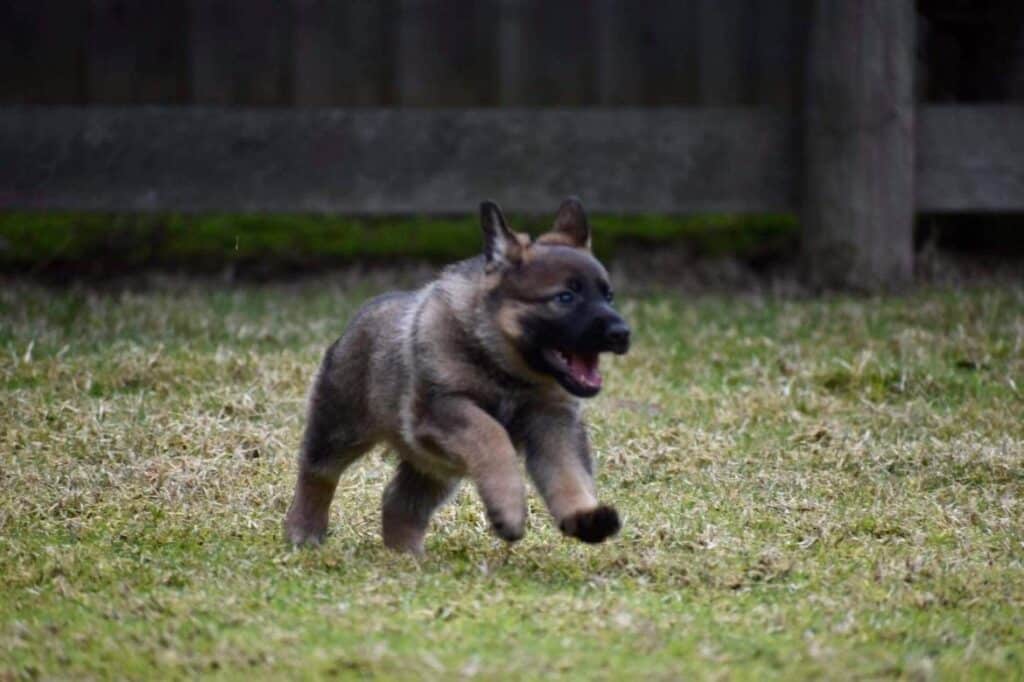
Before your puppy is fully vaccinated, it’s essential to take precautions to ensure their safety while still providing socialisation opportunities. In this section, we’ll discuss how to safely socialise your puppy before full vaccination.
Choose low-risk locations such as your own backyard or a friend’s house. Avoid public parks, pet stores, and other places where there may be a higher risk of exposure to disease.
Attend puppy classes that are held indoors and are supervised by a professional. This is a very good article.
Choosing Low-Risk Locations
While your puppy is awaiting full vaccination, it’s important to choose low-risk locations for socialisation. Opt for quiet, controlled environments such as banks or trusted friends’ homes, where exposure to potential diseases is minimal.
Avoid dog parks or busy streets until your puppy is fully vaccinated, as these areas pose a higher risk for disease transmission.
Attending Puppy Classes
Puppy classes are a fantastic way to safely socialise your puppy before full vaccination. Look for classes that use reward-based training methods and are taught by certified professionals. Ensure your puppy is up to date on their vaccinations and deworming before attending to minimise the risk of disease transmission.
Puppy classes not only provide essential socialisation opportunities, but also help teach basic obedience skills and build a strong foundation for future training.
Utilising Puppy Playgroups
Puppy playgroups are another excellent option for safely socialising your puppy before full vaccination. Coordinate with friends or neighbors who have healthy, vaccinated, and well-socialised puppies or adult dogs to arrange supervised playdates.
This allows your puppy to interact with other dogs in a controlled and low-risk environment, helping them develop essential social skills.
Handling Your Puppy's Fears and Anxieties
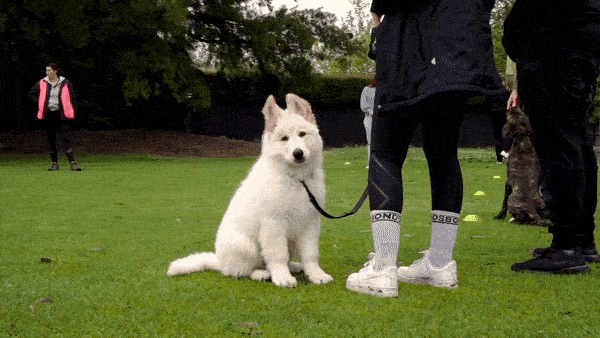
As you work on socialising your puppy, it’s important to recognise and address any fears and anxieties they may develop. In this section, we’ll discuss how to handle your puppy’s fears and anxieties.
Recognising signs of stress is the first step. Look for signs such as cowering, trembling, or hiding. Once you’ve identified the signs, you can start to build your puppy’s confidence gradually. This can be done through positive reinforcement, such as providing treats and praise when they interact with new people.
Recognising Signs of Stress
Being able to recognise signs of stress in your puppy is essential for addressing their fears and anxieties. Growling, whining, barking, abnormal posture, increased heart rate, panting, pacing, yawning, drooling, and compulsive behaviours are all indicators of stress in your puppy.
By identifying these signs, you can take the necessary steps to help your puppy feel more comfortable and at ease in stressful situations.
Building Confidence Gradually
To help your puppy build confidence and overcome their fears, it’s important to take a gradual approach. Start with basic obedience training to build a strong foundation and then slowly introduce them to new and potentially scary situations.
Always use positive reinforcement to reward your puppy for their progress and ensure they are not pushed too far outside their comfort zone.
Using Treats and Distractions
Treats and distractions can be invaluable tools for helping your puppy overcome their fears and anxieties. By offering high-value treats and engaging distractions, you can help your puppy focus on the positive aspects of a situation rather than their fear.
This approach can be particularly helpful when introducing your puppy to new people, animals, or environments.
Enrolling in Puppy Training Classes
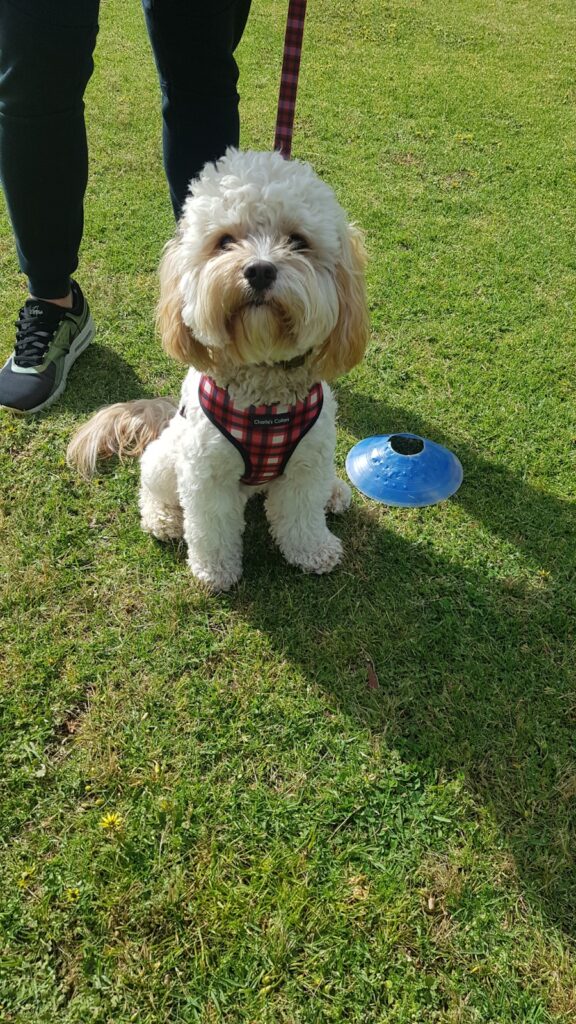
Enrolling in puppy training classes is a fantastic way to supplement your puppy’s socialisation process. Not only do these classes provide opportunities for your puppy to interact with other dogs and people, but they also teach essential obedience skills and help build a strong foundation for future training.
In this section, we’ll discuss how to find a reputable trainer and observe class dynamics to ensure the best experience for you and your puppy.
Finding a Reputable Trainer
When looking for a reputable trainer, start by seeking referrals from trusted friends, family members, or local community pages. Look for trainers who hold certifications and employ reward-based training methods with food, play, or toys.
Be sure to attend a training class to observe the trainer’s attitude, ensuring they are patient, encouraging, and respectful.
Observing Class Dynamics
Attending a puppy training class is a great opportunity to observe class dynamics and ensure a safe, positive learning environment for your pup. Pay attention to how the trainer interacts with the students, the student-to-instructor ratio, and how the puppies are responding to the training methods.
This will help you determine if the class is a good fit for you and your puppy, setting the stage for a successful training experience.
Summary
In conclusion, proper puppy socialisation is essential for raising a confident, well-rounded, and well-behaved adult dog. By prioritising early socialisation, introducing your puppy to various people, animals, and environments, and enrolling in puppy training classes, you’re setting your puppy up for success throughout their life. Remember, the key is to be patient, consistent, and positive in your approach and to always keep your puppy’s well-being at the forefront of your socialisation efforts.
Frequently Asked Questions
It is never too late to socialise your pup, however, the earlier you start the better. Early socialisation helps to ensure your pup develops into a well-rounded and happy adult dog. Starting between 7 and 12 weeks of age is best.
Late socialisation efforts may be complicated by problematic behaviours developing in the interim. Start now and give your pup the best start in life!
Start socialising your puppy as soon as possible. It’s recommended to start the process between three and fourteen weeks of age, before your pup is fully vaccinated and has finished the first round of deworming. Creating positive associations with new people and animals now can have a lasting impact on their behaviour later on.
The optimal time to start socialising your puppy is between 3-14 weeks of age, when they are most primed for positive social learning. Prior to attending socialisation classes, make sure that your puppy has received their first round of vaccinations and dewormers at least 7 days before the class starts.
When introducing your puppy to new people, it’s important to provide a calm and positive environment. Let them approach and greet the person in their own time and reward good behavior.
Introduce people to your puppy slowly and ensure that everyone is respectful of the pup’s boundaries. With a little patience and guidance, you can help them build trusting relationships with those around them.


